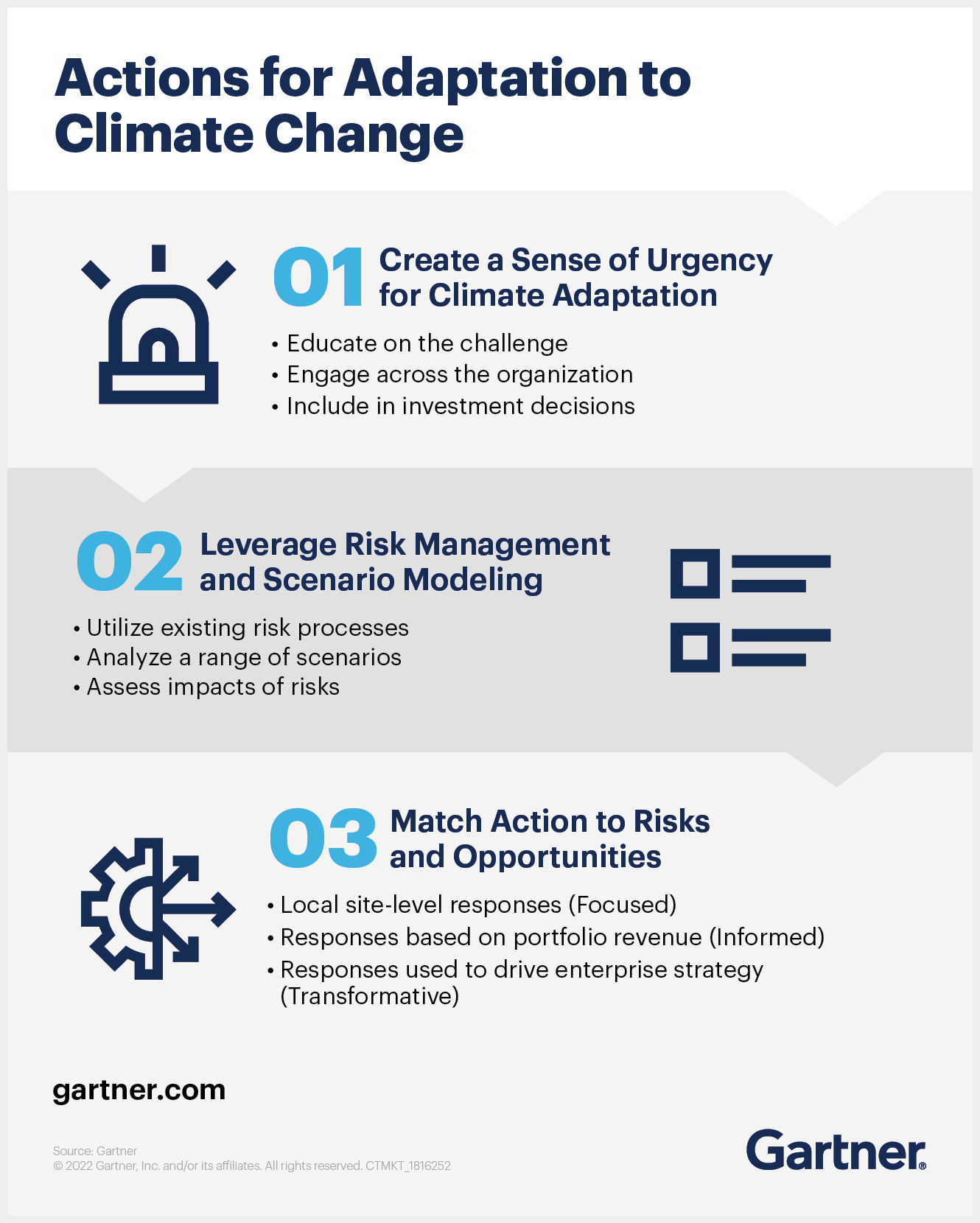June 01, 2022
- Gartner client? Log in for personalized search results.
3 Key Actions for Supply Chain's Response to Climate Change
Contributor: Heather Wheatley
The impacts are immediate, and the time to act is now.
The evidence that our world is experiencing a changing climate is now undisputed. In the past year, the Intergovernmental Panel on Climate Change (IPCC) has issued a string of reports, each more depressing reading than the last. The message is stark: Climate change is affecting every inhabited region across the globe. This includes the United States, which experienced 20 separate billion-dollar weather events in 2021, and Australia, which has seen a 16% decline in rainfall since 1970.
Watch our experts: Progress from Strategy to Action on Sustainability
The top 3 climate change impacts on supply chain
What to do about the impacts of climate change poses a dilemma for supply chains. Should we act now or wait to see what might happen? Our research tells us that the impacts are being felt now. This transcends the environmental effects of wildfires, floods and freezes that traditionally come to mind.
The impacts of climate change are typically split into three groups:
- Transition risks arise from policy and market changes as we transition to a lower-carbon economy. For example, if the cost of carbon and regulations on emissions increases, fossil fuel assets may become stranded. Stranded assets are subject to premature write-down and don’t yield expected financial returns.
- Physical risks can be event-driven (acute) or represent longer-term shifts in climate patterns (chronic). Event risks include floods and wildfires. Longer-term shifts include the risks of increased average temperatures, rising sea levels and chronic heat waves.
- Climate change opportunities can be realized as consumer preferences for products or services change, or as new markets open for products. For example, we are seeing growth in the adoption of electric vehicles and the associated charging infrastructure.
Learn more: Sustainable Business Strategy for a Positive Social and Environmental Impact
I acknowledge that it can be overwhelming to consider all the risks and opportunities, but doing nothing is not an option. The impacts of climate change are only going to increase, and it’s imperative we invest in what’s needed to make our businesses resilient and adaptive.
Actions to adapt to climate change
So where do supply chain leaders start? In a recent report, Gartner introduced three key actions supply chain leaders can take to move the dial.
- Create a sense of urgency for climate adaptation: CSCOs must engage with other leaders to build the business case for action by reiterating the message that inaction will lead to more frequent and increasingly costly disruptions. Work with experts to simplify the messages on climate change so that they relate to the business context. This will enable the organization to facilitate investment in solutions that manage risk.
- Leverage risk management and scenario modeling: Use existing processes to help identify risks and opportunities. Overlay these with scenarios that define plausible versions of the future. The IPCC and World Economic Outlook provide a great starting point. Once you’ve done this, assess the impacts of risks to facilitate determining an effective response.
- Match action to risks and opportunities: Actions on climate change fall on a continuum, starting with focused adaptation, which centers around local, site-based actions. This creates minimum capabilities to react to risk and generally comes in the form of engineered solutions and business continuity plans. This approach works well in the short term but does not guarantee long-term success.
Learn more: Supply Chain Planning — Your Strategic Guide to What, Why and How
Informed adaptation comes next, with both an assessment based on revenue generated and the impacts of different scenarios on the product portfolio and footprint. The supply chain and wider enterprise focus actions based on revenue protection, not on location or site.
Finally, those organizations that are both responding to risks and seizing opportunity are moving toward transformative adaptation approaches. Climate change is informing company strategy. These organizations take a long-term view of the business, with each decision weighed against its climate change impact. In this case, climate change is seen as both a near- and long-term threat and an opportunity for differentiation to achieve competitive advantage.
In short:
- Climate change is affecting every inhabited region across the globe, and its impacts go beyond the environmental effects that may immediately come to mind.
- The impacts of climate change are typically split into three groups: transition risks, physical risks and opportunities.
- Supply chain leaders should create a sense of urgency for climate adaptation, leverage risk management and scenario modeling, and match action to risk and opportunities.
Heather Wheatley is a Senior Director Analyst on the Gartner CSCO Enablement team. Her research interests include supply chain risk strategy, risk identification and assessment, risk reporting, sustainable supply chain and risk assurance.
A version of this story was originally published on the Gartner Blog Network.
Experience Supply Chain conferences
Join your peers for the unveiling of the latest insights at Gartner conferences.
Recommended resources for Gartner clients*:
Supply Chain Executive Report: Supply Chain Adaptation Responses to a Changing Climate
2022 CEO Survey: Sustainability and ESG Become Enduring Change
Supply Chain Podcast: Exploring Sustainability Trends on Earth Day With Sarah Watt
*Note that some documents may not be available to all Gartner clients.

